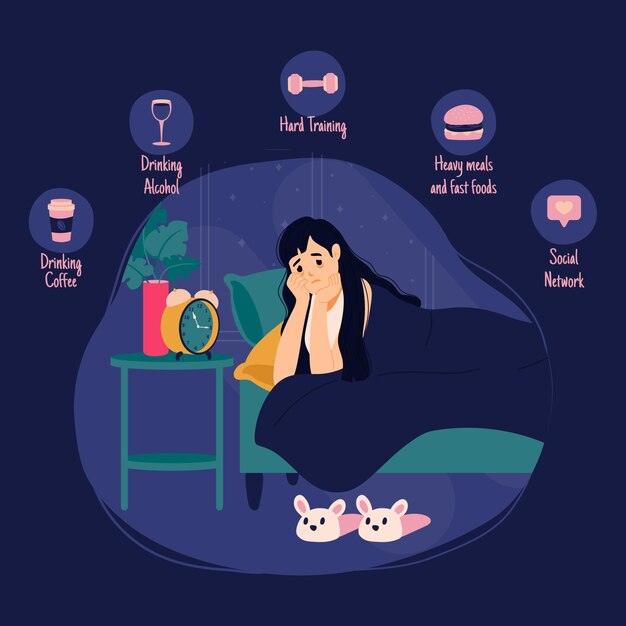
Sleep disorders refer to difficulties in maintaining quality sleep over a long period, often caused by physical, psychological, or environmental factors. If the issue is short-lived, it may not be a big concern. However, when it persists, it becomes a medical condition requiring immediate attention. Fortunately, there are effective home remedies to handle sleep disorders.
Insomnia and trouble sleeping have become common health concerns worldwide. Everyday stresses from work, relationships, personal failures, and dissatisfaction often trigger sleep problems, which can gradually impact a person’s overall well-being. People dealing with sleep disorders tend to feel restless, drained, and unable to function effectively in their daily lives. If untreated, chronic sleep issues can lead to severe physical and mental health challenges, including depression, anxiety, irritability, and even chronic body pain.
### Causes of Sleep Disorders
There are several reasons why sleep disorders develop. Here are some of the most common causes:
**Allergies and Respiratory Issues**
Allergies, colds, or asthma can make breathing difficult at night, leading to disrupted sleep. A blocked nose or restricted airflow affects your ability to sleep comfortably, potentially resulting in long-term sleep disorders.
**Chronic Pain**
Ongoing pain from health conditions like arthritis, migraines, or backaches can prevent restful sleep. Even if someone manages to fall asleep, discomfort from chronic pain often interrupts or reduces the quality of their sleep.
**Nocturia (Frequent Urination)**
Frequent nighttime trips to the bathroom can disturb your sleep, especially if caused by hormonal imbalance or urinary tract issues. Over time, this can lead to more serious sleep problems if not addressed.
**Stress and Anxiety**
High stress and anxiety levels disrupt mental calmness, making it challenging to either fall or stay asleep. Those affected may wake up frequently, have nightmares, or even talk or walk in their sleep.
**Aging**
As people age, they tend to experience lighter and shorter sleep. Medical treatments, hormonal changes, and other age-related factors often contribute to sleep disorders in older adults.
**Medication Side Effects**
Certain medications prescribed for health conditions can interfere with your ability to sleep soundly.
**Night Shift Work**
People working night shifts often struggle to maintain a consistent sleep schedule. Disruptions to their natural circadian rhythm can lead to long-term sleep issues.
**Genetics**
Some sleep disorders have been found to have a genetic link, making sound sleep a challenge for certain individuals.
### Symptoms of Sleep Disorders
The symptoms of sleep disorders vary based on the type of problem:
– **Insomnia**: Difficulty falling or staying asleep, waking up too early, or feeling tired even after a full night’s rest. Other issues include irritability, trouble concentrating, and excessive daytime fatigue.
– **Delayed Sleep Phase Syndrome (DSPS)**: Trouble falling asleep before late-night hours, resulting in constant tiredness and drowsiness during the day.
– **REM Sleep Behavior Disorder (RBD)**: Individuals physically act out their dreams, such as kicking, screaming, or punching. This behavior may sometimes harm themselves or others.
– **Narcolepsy**: Sudden, uncontrollable sleep episodes during the day, even during conversations. People may also experience hallucinations, sleep paralysis, or sleepwalking.
– **Sleep Apnea**: Symptoms include loud snoring, difficulty breathing during sleep, and waking up with a dry mouth or throat.
– **Night Terrors**: Intense nightmares causing yelling, thrashing, fast breathing, and sweating. Some may accidentally injure themselves during these episodes.
### Home Remedies for Sleep Disorders
While chronic sleep disorders might require medical intervention, several home remedies and lifestyle adjustments can significantly improve sleep quality:
**1. Reduce Stress**
Stress often takes a toll on sleep. Engage in activities that calm your mind, such as playing a game, reading, or doing a hobby. As stress decreases, so will sleep-related issues like daytime fatigue and restlessness.
**2. Create a Sleep-Friendly Environment**
Ensure your bedroom is peaceful and comfortable. Block out light with curtains, turn off electronic devices, and eliminate distractions to create an environment conducive to restful sleep.
**3. Improve Your Bed and Mattress**
Sleeping on a poorly maintained mattress or uncomfortable pillow can ruin your sleep quality. Regularly assess the condition of your bedding and replace it if necessary. A comfortable setup makes a significant difference.
**4. Avoid Afternoon Naps**
Daytime napping can disrupt your nighttime sleep. If you feel drowsy in the afternoon, try incorporating a balanced lunch with healthy snacks for sustained energy throughout the day. Morning exercise can also keep you alert and minimize the temptation to nap.
**5. Stick to a Sleep Schedule**
Train your body by going to bed and waking up at the same time daily, even if you don’t feel tired right away. Over time, this consistency helps regulate your sleep pattern.
**6. Limit Gadget Use Before Bedtime**
Avoid using phones, TVs, or other gadgets a few hours before sleep. Blue light and constant notifications can interfere with your body’s ability to relax and fall asleep naturally.
**7. Add Exercise and Meditation to Your Routine**
Daily exercise boosts blood circulation and muscle relaxation, promoting better sleep. Additionally, meditation calms your mind and reduces stress, helping you fall asleep more easily and improve overall focus.
By following these simple yet effective remedies consistently, you can address sleep disorders and enhance your overall health. Remember, positive outcomes take time, so be patient and keep practicing these healthy habits!